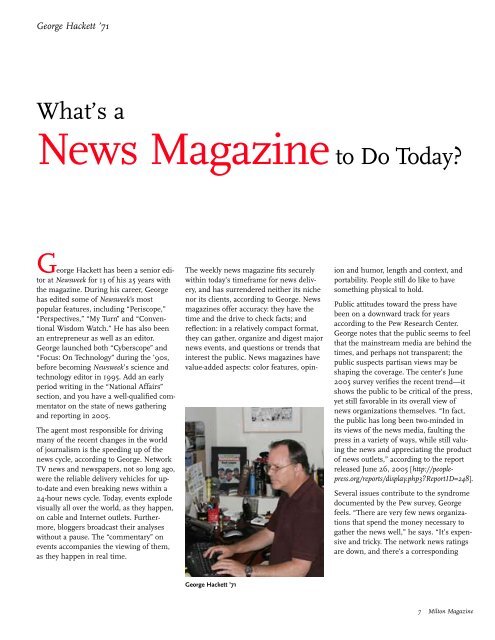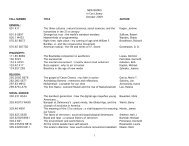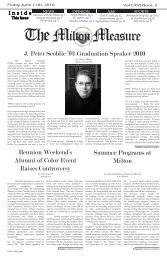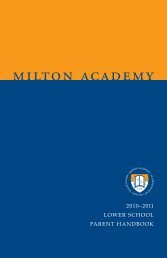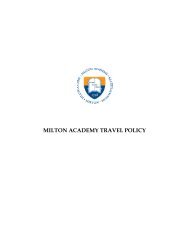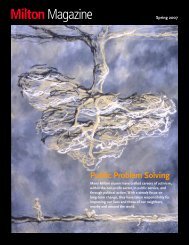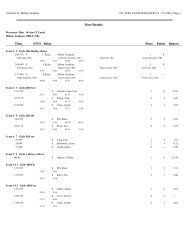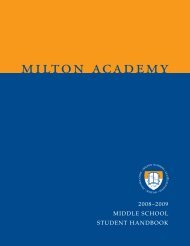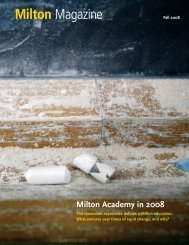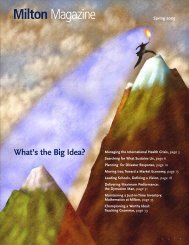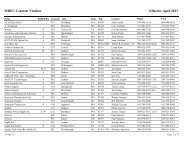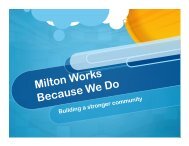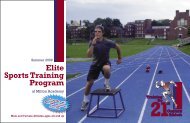puter) and read a piece. Bored? Procrastinating?Click over and read. Follow thehyperlinks. Computers are in most everyone’sgeneral environment.12. Length of articles: In spite of theopen-endedness of Web (length or articlescan be unlimited), editors are very consciousof attention span. Short (800words, about the length of a New YorkTimes op-ed piece) is the goal. Does thepiece need to be longer? It can be brokeninto two installments (the Web is notbound by a print schedule), or brokenapart in subsections, linked by hyperlinks.13. You always hear from readers.Readers write a blogpost or send an email.The friction level between them and aresponse is so low, they’ll click and comment.“You have no idea what you’re talkingabout, and here’s why.” Web writersare not different from print writers: theyenjoy heady satisfaction in having theirwriting stimulate response. And—theinteraction is often valuable.14. Where are the female bloggers orop-ed writers? Because the currency of theInternet is the hyperlink, and writers areconnecting to one another in what aredeveloping as groups and networks, arewe witnessing the emergence of a new“old boys club”?15. The promise of the Internet was thatit was a democratic medium; as establishedthus far, there’s a clear hierarchy.If your blog is linked from MSN, it getsmultiples of the highest level of connectionyou typically experience on your site.If you’re linked often, you’re big-time.Writers see numbers of click-throughs totheir articles. Those, plus numerousresponses, feed the journalistic ego.Cathleen EverettWeb Touring with Alice Dubois ’95Alice DuBois ’95 is a senior producer atthe New York Times Travel Web Site.Until this point, our job has been to presentthe Times’ stories in ways that breakthrough the constraints of the print versionand exploit the Web’s capabilities. We useaudio (often interviews of the author, orinterviews of the people the author has featuredin his piece) and video—slide showsthat expand the reader’s sense of place andexperience. Each of the stories that we featureon the Web site has previously beenprinted in the paper, vetted by the paper’seditors. We maintain archives of the NewYork Times articles and we license venueinformation from Fodor’s and want peopleto be able to use the site as a planning center.Along those lines we are also developingmultimedia destination guides: insider’sguides to cities. The Paris guide is done; theBeijing guide is nearly done; one on NewYork is in the works.The Web site has been a “take it or leave it”proposition for many of the Times departmentheads, but we all received a messagefrom Bill Keller, editor in chief, that beginningnow, the Web and the paper will beworking much more closely together.The initiative to link the two strategicallyhas been assigned to John Landman,deputy managing editor in charge of digitaljournalism.The drop in readership experienced by allmajor city newspapers makes other revenuesources, like the Web, important. TheTimes’ Travel Web site always has moreads available than we do page views, andthere’s great potential. I can see plenty ofopportunities that would open up if thepaper and the Web site approached storyideas together and planned joint coverage.The ways in which the paper and the Website are integrated remains to be seen. Thestaffs are in two different buildings now,and the plan is for us to be in the samenew building by 2007. Being in the samespace will change things.I never worked in journalism when I was astudent, but I’ve worked for the Travel Website for five years. It’s stimulating and fun;I work with interesting, smart people andcan combine a number of skills I enjoy—writing and photography—and gain technicalproficiency as well. At this point, thesite’s potential to grow seems guaranteed.Alice DuBois ’956 <strong>Milton</strong> Magazine
George Hackett ’71What’s aNews Magazine to Do Today?George Hackett has been a senior editorat Newsweek for 13 of his 25 years withthe magazine. During his career, Georgehas edited some of Newsweek’s mostpopular features, including “Periscope,”“Perspectives,” “My Turn” and “ConventionalWisdom Watch.” He has also beenan entrepreneur as well as an editor.George launched both “Cyberscope” and“Focus: On Technology” during the ’90s,before becoming Newsweek’s science andtechnology editor in 1995. Add an earlyperiod writing in the “National Affairs”section, and you have a well-qualified commentatoron the state of news gatheringand reporting in <strong>2005</strong>.The agent most responsible for drivingmany of the recent changes in the worldof journalism is the speeding up of thenews cycle, according to George. NetworkTV news and newspapers, not so long ago,were the reliable delivery vehicles for upto-dateand even breaking news within a24-hour news cycle. Today, events explodevisually all over the world, as they happen,on cable and Internet outlets. Furthermore,bloggers broadcast their analyseswithout a pause. The “commentary” onevents accompanies the viewing of them,as they happen in real time.The weekly news magazine fits securelywithin today’s timeframe for news delivery,and has surrendered neither its nichenor its clients, according to George. Newsmagazines offer accuracy: they have thetime and the drive to check facts; andreflection: in a relatively compact format,they can gather, organize and digest majornews events, and questions or trends thatinterest the public. News magazines havevalue-added aspects: color features, opinionand humor, length and context, andportability. People still do like to havesomething physical to hold.Public attitudes toward the press havebeen on a downward track for yearsaccording to the Pew Research Center.George notes that the public seems to feelthat the mainstream media are behind thetimes, and perhaps not transparent; thepublic suspects partisan views may beshaping the coverage. The center’s June<strong>2005</strong> survey verifies the recent trend—itshows the public to be critical of the press,yet still favorable in its overall view ofnews organizations themselves. “In fact,the public has long been two-minded inits views of the news media, faulting thepress in a variety of ways, while still valuingthe news and appreciating the productof news outlets,” according to the reportreleased June 26, <strong>2005</strong> [http://peoplepress.org/reports/display.php3?ReportID=248].Several issues contribute to the syndromedocumented by the Pew survey, Georgefeels. “There are very few news organizationsthat spend the money necessary togather the news well,” he says. “It’s expensiveand tricky. The network news ratingsare down, and there’s a correspondingGeorge Hackett ’717 <strong>Milton</strong> Magazine
- Page 3 and 4: 283440Journalism at Milton24 Studen
- Page 6 and 7: One piece of AOL programming that h
- Page 10 and 11: decrease in the amount spent on res
- Page 12 and 13: “The biggest change is corporatei
- Page 14 and 15: Jesse Sarles ’93“It’s a flexi
- Page 16 and 17: Felicia Taylor ’82Ned Roberts ’
- Page 18: “I don’t go through a lot of me
- Page 21 and 22: This summer, Peter was in the midst
- Page 23 and 24: Ty Burr ’76“On one level what I
- Page 25 and 26: Later, she enjoyed stints at Workin
- Page 27 and 28: were what to get into at Milton. Ma
- Page 29 and 30: Charlie Riggs, Abby Padien-Havens,
- Page 31 and 32: They say that the tough part was th
- Page 33 and 34: Co-editors of La Voz, 2005:Emma San
- Page 35 and 36: In its three to four annual issues,
- Page 37 and 38: 6 Sam Minkoff ’06 andJamal Sabky
- Page 39 and 40: Student graduation speakers Tanner
- Page 41 and 42: The Robert L. Daley PrizeCreated by
- Page 43 and 44: 1 Llewellyn Howland ’552 Derick F
- Page 45 and 46: 11 Robin Robertson with the MiltonM
- Page 47 and 48: The Head of SchoolMilton’s Magazi
- Page 49 and 50: I began to inventory the sensations
- Page 51 and 52: Hadley Davis Rierson ’89speaking
- Page 53 and 54: Emmy Norris is a prowler for “cul
- Page 55 and 56: A collection of symbols, none more
- Page 57 and 58: Middle School Tackles Complex Probl
- Page 59 and 60:
Gratwick Performersdents prior to t
- Page 61 and 62:
He changed his mind, though,soon mo
- Page 63 and 64:
Creating Cityscapes:Third-grade stu
- Page 65 and 66:
New Roles for Milton Faculty Member
- Page 67 and 68:
Hugh R. SilbaughUpper School Princi
- Page 69 and 70:
Academy. Jorge was singularlyfocuse
- Page 71 and 72:
There are many variations foreach s
- Page 73 and 74:
Class of 1950, front row (left to r
- Page 75 and 76:
Class of 1955, front row (left to r
- Page 77 and 78:
Class of 1980, holding banner (left
- Page 79 and 80:
Class of 1990, front row (left to r
- Page 81 and 82:
Class of 1995, front row (left to r
- Page 83 and 84:
Margaret Creighton WilliamsMargaret
- Page 85 and 86:
The Lexi Rudnitsky Poetry Projectsp
- Page 87 and 88:
Milton AcademyBoard of Trustees, 20


